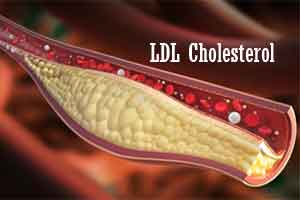- Home
- Editorial
- News
- Practice Guidelines
- Anesthesiology Guidelines
- Cancer Guidelines
- Cardiac Sciences Guidelines
- Critical Care Guidelines
- Dentistry Guidelines
- Dermatology Guidelines
- Diabetes and Endo Guidelines
- Diagnostics Guidelines
- ENT Guidelines
- Featured Practice Guidelines
- Gastroenterology Guidelines
- Geriatrics Guidelines
- Medicine Guidelines
- Nephrology Guidelines
- Neurosciences Guidelines
- Obs and Gynae Guidelines
- Ophthalmology Guidelines
- Orthopaedics Guidelines
- Paediatrics Guidelines
- Psychiatry Guidelines
- Pulmonology Guidelines
- Radiology Guidelines
- Surgery Guidelines
- Urology Guidelines
LDL Cholesterol levels for preventing Stroke Recurrence-Check it out

The desirable LDL-cholesterol level for preventing stroke recurrence has still not been defined. To define desirable LDL-cholesterol levels for preventing stroke recurrence Dr.Naohisa Hosomi from the Department of Clinical Neuroscience and Therapeutics, Hiroshima University Graduate School of Biomedical and Health Sciences, Japan, and colleagues conducted a study to define desirable target low-density lipoprotein (LDL) cholesterol levels for the prevention of stroke recurrence.The researchers have found that composite risk of stroke and transient ischemic attack reduced in the post-randomized LDL cholesterol level of 80 to 100 mg/dL after adjusting for statin usage. The findings of the study have been published in Stroke.
The researchers performed a post hoc analysis in the J-STARS study (Japan Statin Treatment Against Recurrent Stroke) in which subjects (n=1578) were divided into groups based on the mean value of post-randomized LDL cholesterol levels until the last observation in 20 mg/dL increments. Adjusted hazard ratios (HRs) and 95% confidence intervals were analyzed for each group, with adjustments for baseline LDL cholesterol, baseline body mass index, hypertension, diabetes mellitus, and statin usage.
The researchers found that postrandomized LDL cholesterol level until the last observation was 104.1±19.3 mg/dL in the pravastatin group and 126.1±20.6 mg/dL in the control group. The adjusted HRs for stroke and transient ischemic attack and all vascular events decreased in the post-randomized LDL cholesterol level of 80 to 100 mg/dL (P=0.23 and 0.25 for the trend, respectively). The adjusted HR for atherothrombotic infarction significantly reduced the usage of statin after adjusting baseline LDL cholesterol levels (HR, 0.39; 95% confidence intervals, 0.19–0.83). The adjusted HR for atherothrombotic infarction and intracranial hemorrhage were similar among the post-randomized LDL-cholesterol–level subgroups (P=0.50 and 0.37 for the trend, respectively). The adjusted HR for lacunar infarction decreased in the post-randomized LDL cholesterol level of 100 to 120 mg/dL (HR, 0.45; 95% confidence intervals, 0.20–0.99; P=0.41 for the trend).
The authors concluded that the composite risk of stroke and transient ischemic attack reduced in the post-randomized LDL cholesterol level of 80 to 100 mg/dL after adjusting for statin usage. “The lower it is, the better it is.”The study confirms that Lower LDL is better — the higher your LDL is, the greater your risk of developing heart disease or having a heart attack or stroke.
For further reference log on to :
https://doi.org/10.1161/STROKEAHA.117.018870

Disclaimer: This site is primarily intended for healthcare professionals. Any content/information on this website does not replace the advice of medical and/or health professionals and should not be construed as medical/diagnostic advice/endorsement or prescription. Use of this site is subject to our terms of use, privacy policy, advertisement policy. © 2020 Minerva Medical Treatment Pvt Ltd